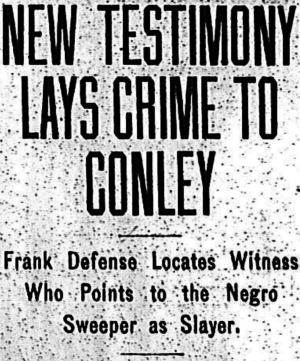New Testimony Lays Crime to Conley
The Atlanta Georgian
Friday, July 4, 1913
Frank Defense Locates Witness Who Points to the Negro Sweeper as Slayer.
A new witness, said to have the most damaging evidence yet produced against Jim Conley, the negro sweeper in the National Pencil factory, entered the Phagan case Thursday and made an affidavit, the contents fo [sic] which are carefully guarded by attorneys for Leo M. Frank, charged with causing the death of the factory girl.
The identity of the witness is as much a secret as the exact nature of his testimony. It was learned, though, that the affidavit was made in the law office of Joseph Leavitt in the Grant Building and was witnessed by Mr. Leavitt’s stenographer.
It is said the testimony of this man connects Conley more directly with the crime than any other statement or affidavit yet procured by the defense. The witness is understood to have seen Conley on the afternoon of the crime and to have heard him make remarks in his drunken condition which were extremely incriminating.
Conley Faces Arrest.
The new affidavit is interpreted to mean that a warrant soon will be sworn out through a magistrate’s court for the arrest of Conley. William M. Smith, attorney for Conley, said several days ago that if his client was made a defendant in the case he would retaliate upon the lawyers for Frank by issuing subpenas duces tecum, commanding them to appear in court with all the important statements and affidavits which they have obtained from witnesses for their side of the case.
Such a move would be giving the attorneys for Frank a little of their own medicine, as Attorney Rosser created a sensation a week ago by issuing subpenas duces tecum for Solicitor Dorsey, Chief Beavers, Chief Lanford, Pinkerton Detective Harry Scott and all the city detectives who had worked on the Phagan mystery.
They were commanded to bring into court all affidavits and statements of Jim Conley, Newt Lee, W. M. Matthews, Monteen Stover and other vital witnesses for the State.
Branded as “Trick.”
Solicitor Dorsey and Attorney Frank A. Hooper, who is associated with Mr. Dorsey in the prosecution, at once branded the move as a thin trick for the purpose of discrediting the State’s witnesses. The sworn statements would be used, they said, to compare with the testimony of the State’s witnesses when on the stand.
If there were the slightest deviation through a natural lapse of memory or through trifling inaccuracy, the prosecution asserted, the defense would seek to take advantage of this to impeach the witnesses’ testimony.

